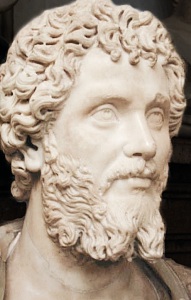

Thus, Septimius Severus spent the remainder of his second term as quaestor on the island. Control of the province was handed over to the emperor, while the Senate gained temporary control of Sardinia as compensation. Before he was able to leave Africa, Moorish tribesmen invaded southern Spain. The sudden death of his father necessitated a return to Leptis Magna to settle family affairs. After his first term as quaestor, he was ordered to serve a second term at Baetica (southern Spain), but circumstances prevented Severus from taking up the appointment. The Antonine Plague had severely thinned the senatorial ranks and with capable men now in short supply, Severus' career advanced more steadily than it otherwise might have. On 5 December, he took office and was officially enrolled in the Roman Senate.īetween 170 and 180 the activities of Septimius Severus went largely unrecorded, in spite of the fact that he occupied an impressive number of posts in quick succession. At the end of 169, Severus was of the required age to become a quaestor and journeyed back to Rome. According to the Historia Augusta, a usually unreliable source, he was prosecuted for adultery during this time but the case was ultimately dismissed.

With his career at a halt, Severus decided to temporarily return to Leptis, where the climate was healthier. To make matters worse, the Antonine Plague swept through the capital in 166. However, he omitted the military tribunate from the cursus honorum and was forced to delay his quaestorship until he had reached the required minimum age of 25. It is likely that he served as a vigintivir in Rome, overseeing road maintenance in or near the city, and he may have appeared in court as an advocate. Nevertheless, it appears that Severus' career during the 160s was beset with some difficulties. Membership of the senatorial order was a prerequisite to attain the standard succession of offices known as the cursus honorum, and to gain entry into the Roman Senate. By recommendation of his 'uncle', Gaius Septimius Severus, he was granted entry into the senatorial ranks by emperor Marcus Aurelius. Sometime around 162, Septimius Severus set out for Rome seeking a public career. Presumably, Severus received lessons in oratory, and at age 17, he gave his first public speech. Little else is known of the young Severus' education but according to Cassius Dio, the boy had been eager for more education than he had actually got. He spoke the local Punic language fluently but he was also educated in Latin and Greek, which he spoke with a slight accent. Septimius Severus was brought up at his home town of Leptis Magna. Severus’s maternal cousin was Praetorian prefect and consul Gaius Fulvius Plautianus. Severus' siblings were an older brother, Publius Septimius Geta, and a younger sister, Septimia Octavilla. His mother's family had moved from Italy to North Africa and was of the Fulvius gens, an ancient and politically influential clan which was originally of plebeian status. Severus' father was an obscure provincial who held no major political status, but he had two cousins, Publius Septimius Aper and Gaius Septimius Severus, who served as consuls under emperor Antoninus Pius. He was of Italian Roman ancestry on his mother's side and of Punic or Libyan-Punic ancestry on his father's. Severus came from a wealthy, distinguished family of equestrian rank. Septimius Severus was born on 11 April 145 at Leptis Magna (in modern Libya), son of Publius Septimius Geta and Fulvia Pia. With the succession of his sons, Severus founded the Severan dynasty, the last dynasty of the empire before the Crisis of the Third Century. Severus died in 211 at Eboracum, succeeded by his sons Caracalla and Geta. Late in his reign he fought the Picts in Caledonia and strengthened Hadrian's Wall in Britain. In 202 he campaigned in Africa against the Garamantes, briefly taking their capital Garama and expanding the southern frontier of the empire radically. Niger was defeated in 194 at the Battle of Issus, and Albinus three years later at the Battle of Lugdunum.Īfter solidifying his rule, Severus waged a brief war against the Parthian Empire, sacking their capital Ctesiphon in 197. After deposing and killing the incumbent emperor Didius Julianus, Severus fought his rival claimants, the generals Pescennius Niger and Clodius Albinus. Severus seized power after the death of Emperor Pertinax in 193 during the Year of the Five Emperors. As a young man, Severus advanced through the customary succession of offices under the reigns of Marcus Aurelius and Commodus. Severus was born in Leptis Magna in the province of Africa. Lucius Septimius Severus (11 April 145 – 4 February 211), commonly known as Septimius Severus or Severus, was Roman Emperor from 193 to 211.


 0 kommentar(er)
0 kommentar(er)
